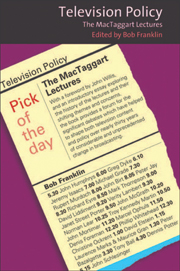Book contents
- Frontmatter
- Contents
- Acknowledgements
- Foreword
- Introduction
- The James MacTaggart Lectures
- TV Drama: The Case against Naturalism
- Naturalism and Television
- Taboos in Television
- Signposting Television in the 1980s: The Fourth Television Channel
- Television Drama, Censorship and the Truth
- The Day after Tomorrow: The Future of Electronic Publishing
- The Primacy of Programmes in the Future of Broadcasting
- Reflections on Working in Film and Television
- ‘Opening up the Fourth Front’: Micro Drama and the Rejection of Naturalism
- Power and Pluralism in Broadcasting
- Ethics, Broadcasting and Change: The French Experience
- Freedom in Broadcasting
- Deregulation and Quality Television
- The Future of Television: Market Forces and Social Values
- The Future of the BBC
- Occupying Powers
- A Culture of Dependency: Power, Politics and Broadcasters
- Talent versus Television
- A Glorious Future: Quality Broadcasting in the Digital Age
- Rewarding Creative Talent: The Struggle of the Independents
- Television versus the People
- Public-Interest Broadcasting: A New Approach
- A Time for Change
- The Soul of British Television
- Television's Creative Deficit
- Freedom of Choice: Public-Service Broadcasting and the BBC
- First Do No Harm
- Appendix A Edinburgh International Television Festival, 29 August–2 September 1977: Programme
- Appendix B Précis of Ted Turner, James MacTaggart Lecture 1982; Dr Jonathan Miller, James MacTaggart Lecture 1983
- Index
Television Drama, Censorship and the Truth
from The James MacTaggart Lectures
Published online by Cambridge University Press: 05 August 2013
- Frontmatter
- Contents
- Acknowledgements
- Foreword
- Introduction
- The James MacTaggart Lectures
- TV Drama: The Case against Naturalism
- Naturalism and Television
- Taboos in Television
- Signposting Television in the 1980s: The Fourth Television Channel
- Television Drama, Censorship and the Truth
- The Day after Tomorrow: The Future of Electronic Publishing
- The Primacy of Programmes in the Future of Broadcasting
- Reflections on Working in Film and Television
- ‘Opening up the Fourth Front’: Micro Drama and the Rejection of Naturalism
- Power and Pluralism in Broadcasting
- Ethics, Broadcasting and Change: The French Experience
- Freedom in Broadcasting
- Deregulation and Quality Television
- The Future of Television: Market Forces and Social Values
- The Future of the BBC
- Occupying Powers
- A Culture of Dependency: Power, Politics and Broadcasters
- Talent versus Television
- A Glorious Future: Quality Broadcasting in the Digital Age
- Rewarding Creative Talent: The Struggle of the Independents
- Television versus the People
- Public-Interest Broadcasting: A New Approach
- A Time for Change
- The Soul of British Television
- Television's Creative Deficit
- Freedom of Choice: Public-Service Broadcasting and the BBC
- First Do No Harm
- Appendix A Edinburgh International Television Festival, 29 August–2 September 1977: Programme
- Appendix B Précis of Ted Turner, James MacTaggart Lecture 1982; Dr Jonathan Miller, James MacTaggart Lecture 1983
- Index
Summary
Mortimer begins with an anecdote to introduce his argument that ‘there is no clear or necessary distinction between fact and fiction, between drama and documentary, between creating and reporting’. Indeed ‘one gives life to the other’ and both are equally important in the search for truth. Consequently, censoring drama is as ‘damaging and dishonest’ as censoring the news.
Mortimer's working life illustrates this synergy between fact and fiction. His simultaneous engagement with law and the theatre prompted the discovery that while the playwright ‘has to face up to the fearful truth of existence’ the lawyer can exist ‘in a world of pure fantasy and make-believe’: the plays of ‘Strindberg … were forced to tell the truth … about married life’ while ‘the divorce laws of England were a web of romantic fairy-tales’. Mortimer argues that truth is essential to drama and must be rooted in the reality experienced by the writer: the ‘best of dramatists … have all dealt in worlds which are quite their own’ and require them, as Proust acknowledged, to ‘read the book of unknown signs within him’.
But television drama has two ‘enemies’: censorship and ratings. Mortimer rejects both. Censors reject material which tends to ‘deprave and corrupt’. Mortimer argues that drama should shock audiences – as Dickens’ accounts of the workhouse did; moreover, any ‘healthy person’ should expect to be ‘shocked and offended at least three times a day’. Ratings also threaten drama and lead to mediocrity.
- Type
- Chapter
- Information
- Television PolicyThe MacTaggart Lectures, pp. 71 - 78Publisher: Edinburgh University PressPrint publication year: 2005

